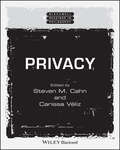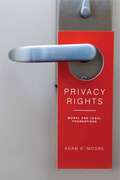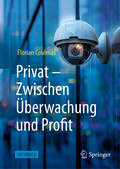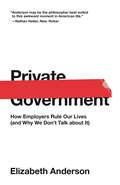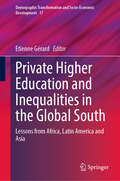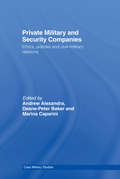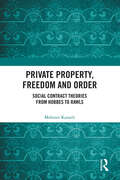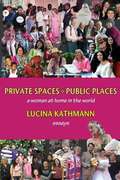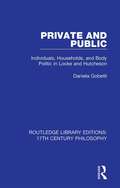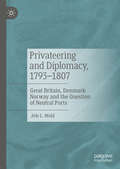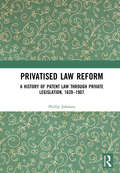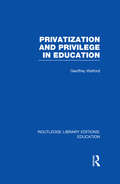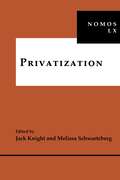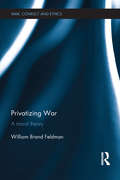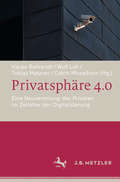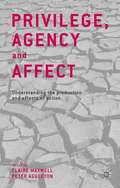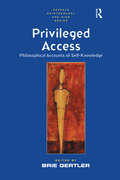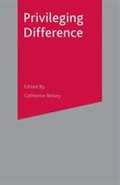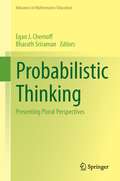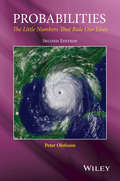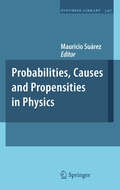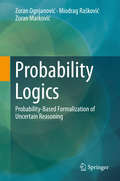- Table View
- List View
Privacy (Wiley Blackwell Readings in Philosophy)
by Steven M. Cahn Carissa VélizAn incisive compendium of philosophical literature on privacy, part of the acclaimed Wiley-Blackwell Readings in Philosophy series Companies collect and share much of your daily life, from your location and search history, to your likes, habits, and relationships. As more and more of our personal data is collected, analyzed, and distributed, we need to think carefully about what we might be losing when we give up our privacy. Privacy is a thought-provoking collection of philosophical essays on privacy, offering deep insights into the nature of privacy, its value, and the consequences of its loss. Bringing together both classic and contemporary work, this timely volume explores the theories, issues, debates, and applications of the philosophical study of privacy. The essays address concealment and exposure, the liberal value of privacy, privacy in social media, privacy rights and public information, privacy and the limits of law, and more. Highlights the work of emerging thinkers and leaders in the subject Presents work from philosophers such as Judith Jarvis Thomson, Ruth Gavison, Thomas Scanlon, W. A. Parent, and Thomas Nagel Explores privacy in contexts including governance, law, ethics, political philosophy, and public policy Discusses data collection, online tracking, digital surveillance, and other contemporary privacy issues Edited by award-winning privacy specialist Carissa Véliz and renowned philosopher and author Steven Cahn, Privacy is a must-read anthology for philosophers, psychologists, sociologists, and advanced undergraduate and graduate students taking courses on digital and applied ethics, philosophy, media studies, communications, computer science, engineering, and sociology.
Privacy Rights: Moral and Legal Foundations
by Adam D. MooreWe all know that Google stores huge amounts of information about everyone who uses its search tools, that Amazon can recommend new books to us based on our past purchases, and that the U.S. government engaged in many data-mining activities during the Bush administration to acquire information about us, including involving telecommunications companies in monitoring our phone calls (currently the subject of a bill in Congress). Control over access to our bodies and to special places, like our homes, has traditionally been the focus of concerns about privacy, but access to information about us is raising new challenges for those anxious to protect our privacy. In Privacy Rights, Adam Moore adds informational privacy to physical and spatial privacy as fundamental to developing a general theory of privacy that is well grounded morally and legally.
Privacy Rights: Moral and Legal Foundations
by Adam D. MooreWe all know that Google stores huge amounts of information about everyone who uses its search tools, that Amazon can recommend new books to us based on our past purchases, and that the U.S. government engaged in many data-mining activities during the Bush administration to acquire information about us, including involving telecommunications companies in monitoring our phone calls (currently the subject of a bill in Congress). Control over access to our bodies and to special places, like our homes, has traditionally been the focus of concerns about privacy, but access to information about us is raising new challenges for those anxious to protect our privacy. In Privacy Rights, Adam Moore adds informational privacy to physical and spatial privacy as fundamental to developing a general theory of privacy that is well grounded morally and legally.
Privacy, Big Data, and the Public Good
by Helen Nissenbaum Julia Lane Victoria Stodden Stefan Bender Julia Lane Victoria Stodden Stefan BenderMassive amounts of data on human beings can now be analyzed. Pragmatic purposes abound, including selling goods and services, winning political campaigns, and identifying possible terrorists. Yet 'big data' can also be harnessed to serve the public good: scientists can use big data to do research that improves the lives of human beings, improves government services, and reduces taxpayer costs. In order to achieve this goal, researchers must have access to this data - raising important privacy questions. What are the ethical and legal requirements? What are the rules of engagement? What are the best ways to provide access while also protecting confidentiality? Are there reasonable mechanisms to compensate citizens for privacy loss? The goal of this book is to answer some of these questions. The book's authors paint an intellectual landscape that includes legal, economic, and statistical frameworks. The authors also identify new practical approaches that simultaneously maximize the utility of data access while minimizing information risk.
Privat: Zwischen Überwachung und Profit
by Florian CoulmasSteht „privat“ für einen Wert der Vergangenheit? Dieses Buch beleuchtet Privatheit aus politischer, rechtlicher, philosophischer und kulturgeschichtlicher Sicht. Die verschiedenen Perspektiven – ein historischer Rückblick auf die Entstehung und Entwicklung des Begriffs in Europa, Vergleiche mit Entsprechungen anderer Kulturen, eine kritische Darstellung der gesellschaftlichen Bedeutung von Privatheit heute und eine Diskussion ihrer politischen und rechtlichen Dimensionen – sollen zum Verständnis beitragen, warum Privatheit Anlass zu Kontroversen gibt und um welche bzw. wessen Interessen es dabei geht.
Private Government: How Employers Rule Our Lives (and Why We Don't Talk about It) (The University Center for Human Values Series #44)
by Elizabeth AndersonWhy our workplaces are authoritarian private governments—and why we can't see itOne in four American workers says their workplace is a "dictatorship." Yet that number probably would be even higher if we recognized most employers for what they are—private governments with sweeping authoritarian power over our lives, on duty and off. We normally think of government as something only the state does, yet many of us are governed far more—and far more obtrusively—by the private government of the workplace. In this provocative and compelling book, Elizabeth Anderson argues that the failure to see this stems from long-standing confusions. These confusions explain why, despite all evidence to the contrary, we still talk as if free markets make workers free—and why so many employers advocate less government even while they act as dictators in their businesses.In many workplaces, employers minutely regulate workers' speech, clothing, and manners, leaving them with little privacy and few other rights. And employers often extend their authority to workers' off-duty lives. Workers can be fired for their political speech, recreational activities, diet, and almost anything else employers care to govern. Yet we continue to talk as if early advocates of market society—from John Locke and Adam Smith to Thomas Paine and Abraham Lincoln—were right when they argued that it would free workers from oppressive authorities. That dream was shattered by the Industrial Revolution, but the myth endures.Private Government offers a better way to talk about the workplace, opening up space for discovering how workers can enjoy real freedom.Based on the prestigious Tanner Lectures delivered at Princeton University's Center for Human Values, Private Government is edited and introduced by Stephen Macedo and includes commentary by cultural critic David Bromwich, economist Tyler Cowen, historian Ann Hughes, and philosopher Niko Kolodny.
Private Higher Education and Inequalities in the Global South: Lessons from Africa, Latin America and Asia (Demographic Transformation and Socio-Economic Development #17)
by Etienne GérardBased on original findings from research carried out in six low- and middle-income countries in Africa, Asia and Latin America, this book brings together conceptual and empirical analyses of private higher education and social and academic inequality, a topic largely unexplored in the social science literature, particularly on private higher education. Field surveys of different categories of actors in numerous private universities have combined common methods and tools in countries chosen for the differences in their social structures and the characteristics, organization and development of their private higher education systems. Based on these qualitative surveys, combined with available quantitative data on higher education, this book analyzes the production and reproduction of social and academic inequalities in countries as diverse as Argentina, Malaysia, Mexico, Peru, the Democratic Republic of Congo, Senegal and Vietnam. Finally, the historical and social structuringof the private education systems in the selected countries provides the framework for analyses that go beyond the traditional higher education demand/supply and public policy approaches to explore the perspective of the actors – institutional administrators, teaching staff and students.
Private Military and Security Companies: Ethics, Policies and Civil-Military Relations (Cass Military Studies)
by Andrew Alexandra Deane-Peter Baker Marina CapariniOver the past twenty years, Private Military and Security Companies (PMSCs) have become significant elements of national security arrangements, assuming many of the functions that have traditionally been undertaken by state armies. Given the centrality of control over the use of coercive force to the functioning and identity of the modern state, and to international order, these developments clearly are of great practical and conceptual interest. This edited volume provides an interdisciplinary overview of PMSCs: what they are, why they have emerged in their current form, how they operate, their current and likely future military, political, social and economic impact, and the moral and legal constraints that do and should apply to their operation. The book focuses firstly upon normative issues raised by the development of PMSCs, and then upon state regulation and policy towards PMSCs, examining finally the impact of PMSCs on civil-military relations. It takes an innovative approach, bringing theory and empirical research into mutually illuminating contact. Includes contributions from experts in IR, political theory, international and corporate law, and economics, and also breaks important new ground by including philosophical discussions of PMSCs.
Private Property, Freedom, and Order: Social Contract Theories from Hobbes To Rawls
by Mehmet KanatliThis book looks at how the ideas of freedom, property, and order are expressed in modern social contract theories (SCTs). Drawing on the theories of Hobbes, Locke, Rousseau, and Rawls, it studies how notions of freedom promulgated by these SCTs invariably legitimise and defend the private ownership of the means of production. It argues that capitalism’s impact on individual dependence and economic inequality still stems from this model, ultimately working in favour of proprietors. The author highlights the problematic nature of SCTs, which work as ideological mechanisms put forward under the guise of formal equality and formal freedom, by focusing on the historical and social context behind them. From a methodological point of view, the author presents a de-ideologization of the contractarian issue and provides insight into the political ‘layers’ within the discourse of individualism, human nature and morality shaping the outer corners of contractarian theory. An important intervention in the study of SCTs, this volume will be of great interest to scholars and researchers of political and social theory, sociology, political history, and political philosophy.
Private Spaces, Public Places: A Woman at Home in the World
by Lucina KathmannA collection of 20 plus essays finding the author, Lucina Kathmann in widely varied roles and spaces; mothering six adopted orphans in her home in the center of Mexico; tutoring middle school math students in Chicago, creating a story about a backward jumping kangaroo to explain the number line; sampling sheep's brains as the honored guest of the Kurdish PEN chapter, traveling the world as a Vice- President of PEN International, always encouraging women writers working at great odds to make their voices heard. Serious and droll by turns, her stories reveal a world seldom open to outsiders from the West.
Private Wrongs
by Arthur RipsteinTort law recognizes the many ways one person wrongs another. Arthur Ripstein brings coherence to torts' diversity in a philosophically grounded, analytically powerful theory. He shows that all torts violate the basic moral idea that each person is in charge of his or her own person and property, and never in charge of another's person or property.
Private and Public: Individuals, Households, and Body Politic in Locke and Hutcheson (Routledge Library Editions: 17th Century Philosophy)
by Daniela GobettiOriginally published in 1992. This arresting and innovative book combines political theory with the history of political thought to question the conceptual conventions and tacit assumptions which surround the concepts of private and public. In seeking the foundations of the modern liberal conception of private and public, she traces it to modern Natural Law thinkers, in particular Locke and Hutcheson. By developing a revised interpretation of seventeenth-century natural jurisprudence, which recognizes that every adult controls an individual or private domain, as well as engaging in political, community or public interaction, Gobetti raises interesting questions about the politics of participation in modern society.
Privateering and Diplomacy, 1793–1807: Great Britain, Denmark-Norway and the Question of Neutral Ports
by Atle L. WoldThis book addresses the British-Danish diplomatic debate on privateering and neutral ports in the period 1793-1807, when Denmark-Norway remained neutral in the war between Britain and France. The British government protested against the use French privateers made of Norwegian ports as bases for their attacks on the British Baltic Sea and Archangel Trades, but the Danish government insisted on keeping the ports open. This led to a running dispute on the relative rights and duties of belligerents and neutrals, but also on violations of the tentative agreement that the two governments reached in 1793. The three main chapters in the book address the principled debate on privateering and neutral ports; the central role played in the debate by the British diplomatic and consular representatives in Denmark-Norway; and privateering in practice. The final two chapters look at the impact of the Dutch change of sides in the war in 1795, and the development from the official closure of the Norwegian ports to privateers in 1799 until Denmark-Norway’s entry into the war on the side of France in 1807.
Privatised Law Reform: A History Of Patent Law Through Private Legislation, 1620-1907
by Phillip JohnsonIn the history of British patent law, the role of Parliament is often side-lined. This is largely due to the raft of failed or timid attempts at patent law reform. Yet there was another way of seeking change. By the end of the nineteenth century, private legislation had become a mechanism or testing ground for more general law reforms. The evolution of the law had essentially been privatised and was handled in the committee rooms in Westminster. This is known in relation to many great industrial movements such as the creating of railways, canals and roads, or political movements such as the powers and duties of local authorities, but it has thus far been largely ignored in the development of patent law. This book addresses this shortfall and examines how private legislation played an important role in the birth of modern patent law.
Privatization and Privilege in Education (Routledge Library Editions: Education)
by Geoffrey WalfordCan privilege be bought? Arguments have raged over whether private education in the UK is ‘the cement in the wall’ dividing British society, or whether parental choice is, as has also been argued ‘a key component of a free society’. The author here describes the traditional private sector schools, paying attention to the ways in which parents can purchase privilege for their children through attendance at such schools. He argues that the privatized system is kept under tight control if a growth in social and educational inequality and a deepening of social class and ethnic group division is to be avoided. The book is unique in combining an account of private schools in Britain with an examination of the process of privatization.
Privatization: NOMOS LX (NOMOS - American Society for Political and Legal Philosophy #29)
by Melissa SchwartzbergA distinguished group of scholars explore the moral values and political consequences of privatization The 21st century has seen a proliferation of privatization across industries in the United States, from security and the military to public transportation and infrastructure. In shifting control from the state to private actors, do we weaken or strengthen structures of governance? Do state-owned enterprises promise to be more equal and fair than their privately-owned rivals? What role can accountability measures play in mediating the effects of privatization; and what role does coercion play in the state governance and control? In this latest installment from the NOMOS series, an interdisciplinary group of distinguished scholars in political science, law, and philosophy examine the moral and political consequences of transferring state-provided or state-owned goods and services to the private sector. The essays consider how we should evaluate the decision to privatize, both with respect to the quality of outcomes that might be produced, and in terms of the effects of privatization on the core values underlying democratic decision-making. Privatization also affects the structure of governance in a variety of important ways, and these essays evaluate the consequences of privatization on the state. Privatization sheds new light on these highly salient questions of contemporary political life and institutional design.
Privatizing War: A Moral Theory (War, Conflict and Ethics)
by William FeldmanThis book offers a comprehensive moral theory of privatization in war. It examines the kind of wars that private actors might wage separate from the state and the kind of wars that private actors might wage as functionaries of the state. The first type of war serves to probe the ad bellum question of whether private actors can justifiably authorize war, while the second type of war serves to probe the in bello question of whether private actors can justifiably participate in war. The cases that drive the analysis are drawn from the rich and complicated history of private military action, stretching back centuries to the Italian city-states whose mercenaries were reviled by Machiavelli. The book also takes up the hypothetical examples conjured by philosophers—the private protective agencies of Robert Nozick’s Anarchy, State, and Utopia, for example, and the private armies of Thomas More’s Utopia. The aim of this book is to propose a theory of privatization that retains currency not only in assessing current military engagements, but past and future ones as well. In doing so, it also raises a set of important questions about the very enterprise of war. This book will be of much interest to students of ethics, political philosophy, military studies, international relations, war and conflict studies, and security studies.
Privatsphäre 4.0: Eine Neuverortung des Privaten im Zeitalter der Digitalisierung
by Catrin Misselhorn Hauke Behrendt Wulf Loh Tobias MatznerWie lässt sich der Bereich des Privaten heute genau beschreiben? Welchen Wert besitzt Privatheit in digitalisierten Gesellschaften für den Einzelnen und die Gesellschaft als Ganzes? Welche Werte und Lebensformen werden durch Privatheit geschützt, welche eingeschränkt? Entstehen durch die Informationsasymmetrie zwischen Technologieunternehmen, staatlichen Verdatungsinstitutionen und Verbrauchern/Bürgern möglicherweise neue Machtstrukturen? Welche rechtlichen Implikationen ergeben sich hieraus? Dieser Band geht diesen und anderen Fragen, die sich im Hinblick auf die etablierte Gleichung von Freiheit und Privatheit stellen, nach und versucht Antworten zu finden.
Privilege, Agency and Affect
by Peter Aggleton Claire MaxwellDrawing on a range of theoretical perspectives and engaging with new empirical evidence from around the world, this collection examines how privilege, agency and affect are linked, and where possibilities for social change might lie.
Privileged Access: Philosophical Accounts of Self-Knowledge (Ashgate Epistemology and Mind Series)
by Brie GertlerHow do you grasp the contents of your mind - your desires, your fears, your sensations, your beliefs? We typically think that we are better able to discern our own mental states than others are. But is this correct? And if it is, what explains your special or 'privileged' access to your own states? Privileged Access is a comprehensive anthology of new and seminal essays, by leading philosophers, about the nature of self-knowledge. Most of the essays are new, including specially commissioned contributions from such prominent thinkers as Bermúdez, Dretske, Lycan, Sosa and others, but the anthology also includes reprints of classic articles by Boghossian, Shoemaker, Wright and others. The volume provides for an in-depth understanding of contemporary answers to key philosophical questions which have strongly influenced developments in epistemology, ontology, and the philosophy of mind since Descartes. Featuring an introductory chapter outlining the main currents of thought about self-knowledge, this comprehensive collection of cutting-edge philosophical work will prove an invaluable resource for students and researchers alike.
Privileging Difference
by Chamsy El-OjeiliDifference, the key term in deconstruction, has broken free of its rigorous philosophical context in the work of Jacques Derrida, and turned into an excuse for doing theory the easy way. Celebrating variety for its own sake, Antony Easthope argues, cultural criticism too readily ignores the role of the text itself in addressing the desire of the reader. With characteristic directness, he takes to task the foremost theorists of the current generation one by one, including Edward Said and Homi Bhabha, Dona Haraway, Rosi Braidotti and Judith Butler. In a final tour de force, he contrasts what he calls the two Jakes, Jacques Lacan and Jacques Derrida, to bring out the way their respective theories need each other. The book is vintage Easthope: wide-ranging, fearless, witty and a radical challenge to complacency wherever it is to be found.
Probabilistic Thinking
by Bharath Sriraman Egan J. ChernoffThis volume provides a necessary, current and extensive analysis of probabilistic thinking from a number of mathematicians, mathematics educators, and psychologists. The work of 58 contributing authors, investigating probabilistic thinking across the globe, is encapsulated in 6 prefaces, 29 chapters and 6 commentaries. Ultimately, the four main perspectives presented in this volume (Mathematics and Philosophy, Psychology, Stochastics and Mathematics Education) are designed to represent probabilistic thinking in a greater context.
Probabilities
by Peter OlofssonPraise for the First Edition"If there is anything you want to know, or remind yourself, about probabilities, then look no further than this comprehensive, yet wittily written and enjoyable, compendium of how to apply probability calculations in real-world situations."- Keith Devlin, Stanford University, National Public Radio's "Math Guy" and author of The Math Gene and The Unfinished GameFrom probable improbabilities to regular irregularities, Probabilities: The Little Numbers That Rule Our Lives, Second Edition investigates the often surprising effects of risk and chance in our lives. Featuring a timely update, the Second Edition continues to be the go-to guidebook for an entertaining presentation on the mathematics of chance and uncertainty. The new edition develops the fundamental mathematics of probability in a unique, clear, and informal way so readers with various levels of experience with probability can understand the little numbers found in everyday life. Illustrating the concepts of probability through relevant and engaging real-world applications, the Second Edition features numerous examples on weather forecasts, DNA evidence, games and gambling, and medical testing. The revised edition also includes:The application of probability in finance, such as option pricingThe introduction of branching processes and the extinction of family namesAn extended discussion on opinion polls and Nate Silver's election predictionsProbabilities: The Little Numbers That Rule Our Lives, Second Edition is an ideal reference for anyone who would like to obtain a better understanding of the mathematics of chance, as well as a useful supplementary textbook for students in any course dealing with probability.
Probabilities, Causes and Propensities in Physics
by Mauricio SuárezThis volume defends a novel approach to the philosophy of physics: it is the first book devoted to a comparative study of probability, causality, and propensity, and their various interrelations, within the context of contemporary physics -- particularly quantum and statistical physics. The philosophical debates and distinctions are firmly grounded upon examples from actual physics, thus exemplifying a robustly empiricist approach. The essays, by both prominent scholars in the field and promising young researchers, constitute a pioneer effort in bringing out the connections between probabilistic, causal and dispositional aspects of the quantum domain. The book will appeal to specialists in philosophy and foundations of physics, philosophy of science in general, metaphysics, ontology of physics theories, and philosophy of probability.
Probability Logics
by Zoran Ognjanović Miodrag Rašković Zoran MarkovićThe aim of this book is to provide an introduction to probability logic-based formalization of uncertain reasoning. The authors' primary interest is mathematical techniques for infinitary probability logics used to obtain results about proof-theoretical and model-theoretical issues such as axiomatizations, completeness, compactness, and decidability, including solutions of some problems from the literature. An extensive bibliography is provided to point to related work, and this book may serve as a basis for further research projects, as a reference for researchers using probability logic, and also as a textbook for graduate courses in logic.
